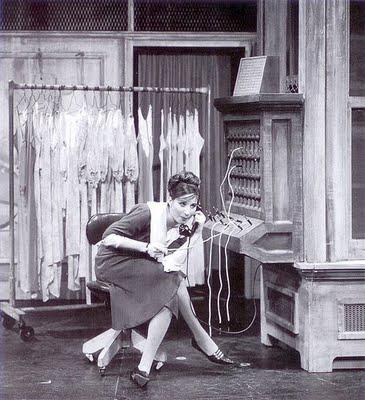I remember Arthur [Laurents] telling me one afternoon while he was casting “I Can Get It for You Wholesale” about having just discovered a remarkable new actress. Her name was Barbra Streisand, he said. He told me how she had awkwardly entered from the wings with music pages falling behind her. Halfway across the stage, she realized what she had done, became embarrassed and walked back in embarrassment to pick them up. Then she asked for a chair to sit in while she sang. They brought her one, she sat in it, then looked around in a panic, stuck her hand in her mouth, took out some gum and put it under the chair. Arthur said: “At that moment, I knew she was a professional.”
-- STEPHEN SONDHEIM, in Comparing Stage Notes on Laurents

She played a minor part in I Can Get It for You Wholesale, but by the end of its brief run, that remarkable young actress had become a star, and the Streisand legend was born. Her character was Miss Marmelstein, a harried, frantic Jewish secretary fretting about how people never seemed to get her name--Yetta Tessye Marmelstein--right. Before this, Streisand, a struggling actress from Brooklyn, had been singing for her supper in New York clubs. At one point, she even worked as a switchboard operator, which so bored her out of her wits that she experimented with answering the phone in a variety of accents and going by the alias Angelina Scarangella.
I Can Get It for You Wholesale was her first foray on the Broadway stage, but even then the famous bullheadedness already showed. She fought to have her sitting-on-a-chair schtick incorporated into her big musical moment, and the endearing awkwardness of the scene--this kooky-looking, put-upon young woman with the big schnoz and even bigger voice swiveling on a chair, hilariously bemoaning her fate--proved her instincts right. It's all there in the original cast recording--Streisand in blazingly youthful voice lighting into Miss Marmelstein and turning the song into a bona-fide musical comedy gem.
Podcast Powered By Podbean
“The evening's find,” wrote Howard Taubman in the New York Times, “is Barbra Streisand, a girl with an oafish expression, a loud irascible voice and an arpeggiated laugh. Miss Streisand is a natural comedienne, and [the composer] Mr. Rome has given her a brash, amusing song, 'Miss Marmelstein,' to lament her secretarial fate.”
And from the biography Her Name is Barbra by Randall Riese: “I saw her opening night in 'Wholesale,'” recalls Barbra's friend Don Softness over thirty years later, and still with a measure of awe, “and she literally stopped the show. People were on their feet screaming and yelling for five minutes. It was eerie. It was electrifying. She was this mousy little girl who had this great big stage presence. The opening night audience in New York was a sophisticated one, and there was no doubt in their mind that they were seeing show business history in the making.”
It was 1962. Barbra Streisand was 19 years old. Funny Girl--and that prophetic musical declaration, I'm the Greatest Star--were just around the bend.
Celeb Magazine
Author's Latest Articles
-
Peta's Rak of Aegis, Rep's August: Osage County Lead Philstage Gawad Buhay!’s 2014 1st/2nd-quarter Citations
-
Trumpets’ The Bluebird of Happiness (16 Nominations) and Tanghalang Pilipino’s Der Kaufmann (12) Lead 2013 Gawad Buhay! Race
-
The Spellbinding Ang Nawalang Kapatid
-
9 Works Theatrical’s Grease Leads Philstage Gawad Buhay’s 2013 4th-quarter Citations

